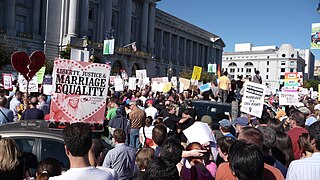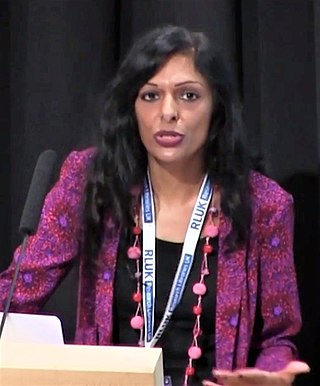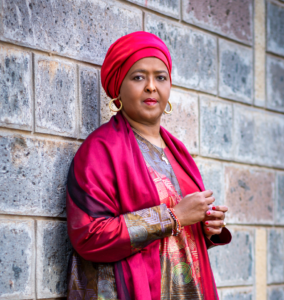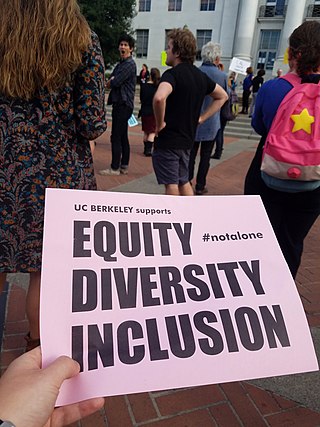Related Research Articles
Special education is the practice of educating students in a way that accommodates their individual differences, disabilities, and special needs. This involves the individually planned and systematically monitored arrangement of teaching procedures, adapted equipment and materials, and accessible settings. These interventions are designed to help individuals with special needs achieve a higher level of personal self-sufficiency and success in school and in their community, which may not be available if the student were only given access to a typical classroom education.
Madeleine Arnot, née MacDonald is a Professor of Sociology of Education at the University of Cambridge, Faculty of Education. She is Director of Studies (Education) at Jesus College. Internationally known for her work on socio-cultural reproduction theory and her use of Basil Bernstein's theory of pedagogy in relation to gender and education.
Malcolm "Mac" MacLachlan is Professor of Psychology and Social Inclusion at Maynooth University, Ireland.
Feminist political ecology is a feminist perspective on political ecology, drawing on theories from Marxism, post-structuralism, feminist geography, ecofeminism and cultural ecology. Feminist political ecology examines the place of intersectional social relations in the political ecological landscape, exploring them as a factor in ecological and political relations. Specific areas in which feminist political ecology is focused are development, landscape, resource use, agrarian reconstruction and rural-urban transformation. Feminist political ecologists suggest gender is a crucial variable – in relation to class, race and other relevant dimensions of political ecological life – in constituting access to, control over, and knowledge of natural resources.
Ableism is discrimination and social prejudice against people with physical or mental disabilities. Ableism characterizes people as they are defined by their disabilities and it also classifies disabled people as people who are inferior to non-disabled people. On this basis, people are assigned or denied certain perceived abilities, skills, or character orientations.
Educational equity, also known as equity in education, is a measure of achievement, fairness, and opportunity in education. The study of education equity is often linked with the study of excellence and equity.
State feminism is feminism created or approved by the government of a state or nation. It usually specifies a particular program. The term was coined by Helga Hernes with particular reference to the situation in Norway, which had a tradition of government-supported liberal feminism dating back to the 1880s, and is often used when discussing the government-supported gender equality policies of the Nordic countries, that are linked to the Nordic model. The term has also been used in the context of developing countries where the government may prescribe its form of feminism and at the same time prohibit non-governmental organizations from advocating for any other feminist program. In this sense it is possible to distinguish between a liberal state feminism found in Western democracies such as the Nordic countries, and a somewhat more authoritarian state feminism that is often also linked to secularism, found e.g. in certain Middle Eastern countries.
Council for Canadians with Disabilities (CCD), formerly known as the Coalition of Provincial Organizations of the Handicapped (COPOH), was created by people with disabilities in 1976 to provide support for all people with disabilities who seek the opportunity to go to school, work, volunteer, have a family, and participate in recreational, sport and cultural activities. The CCD is a national human rights organization of people with disabilities working for an accessible and inclusive Canada. In the 1970s, the CCD became a permanent part of the disability rights movement and it became a fluid entity that includes people with a range of different disabilities. To manage the work that will lead to the achievement of this goal, CCD established the following Committees to guide their activities in key areas:
- Human Rights Committee: Identifies Human Rights Committee issues of concern to persons with disabilities that could be addressed through law reform initiatives.
- Social Policy Committee: Identifies Social Policy Committee issues of national concern to persons with disabilities.
- Transportation Committee
- International Development Committee: Provides advice to CCD National Council on reforms that would improve the effect of Canada's foreign aid and policy on persons with disabilities.
- Access to Technology Committee.

Social equality is a state of affairs in which all individuals within society have equal rights, liberties, and status, possibly including civil rights, freedom of expression, autonomy, and equal access to certain public goods and social services.

Diane Kingston, is a human rights defender and international development specialist. She is the Global Technical Lead for Disability Rights and Equalities Sightsavers and a volunteer for Shout- the mental health crisis text service
Cara Carmichael Aitchison,, FWLA, FLSW is a British social scientist and university leader. She was President and Vice Chancellor of Cardiff Metropolitan University from 2016 to 2024, and was formerly Vice-Chancellor and Chief Executive or Plymouth Marjon University in England (2013–2016). She was previously Dean of Moray House School of Education and Professor in Social and Environmental Justice at Edinburgh University in Scotland (2010–2013) and has an international research profile in the geography and cultural economy of leisure, sport and tourism and in gender studies, cultural identity and social inclusion.

Disability in Brazil is defined when individuals struggle or are unable to complete standard everyday tasks. This is measured by the health indicators of daily activities and physical movement. Defining disability differs according to legal contexts of different environments and levels of vulnerability. Brazil is one of the heaviest populated countries in the world and is the largest country in South America, with a population of 212.56 million people in 2020. Due to population rates, there is approximately 16 million people in Brazil with a disability. Of this, 9 million of these are of working age, and 1 million are in the labor force.
Jos Boys is an architecture-trained, activist, educator, artist and writer. She was a founder member of Matrix Feminist Design Co-operative and co-author of their 1984 book Making Space: Women and the Man-Made Environment. Since 2008 she has been co-director of The DisOrdinary Architecture Project with disabled artist Zoe Partington, a disability-led platform that works with disabled artists to explore new ways to think about disability in architectural and design discourse and practice.
The 2019 New Year Honours are appointments by some of the 16 Commonwealth realms to various orders and honours to recognise and reward good works by citizens of those countries. The New Year Honours are awarded as part of the New Year celebrations at the start of January and were officially announced in The London Gazette at 22:30 on 28 December 2018. Australia, an independent Realm, has a separate honours system and its first honours of the year, the 2019 Australia Day Honours, coincide with Australia Day on 26 January.

Kalwant Bhopal is Professor of Education and Social Justice and Director of the Centre for Research in Race & Education at the University of Birmingham. Her work explores the achievements and experiences of minority ethnic groups in education with a focus on how processes of racism, exclusion and marginalisation operate in predominantly White spaces.

Deqa Yasin Hagi Yusuf is a Human Rights advocate and Social Justice activist, specifically in the areas of gender equality, women's empowerment, disability, children and minority rights. In 2017 she was appointed the Minister for Women and Human Rights in Somalia until October 2020.
Rowena Arshad is Chair in Multicultural and Anti-Racist Education and Co-Director of the Centre for Education for Racial Equality in Scotland (CERES) Moray House School of Education and Sport at the University of Edinburgh. Her doctorate was an interpretive study of teacher activism in equity and anti-discrimination in Scotland and her ongoing research is into equity and anti-discrimination issues in education and within educational policy.

Carla Ravi Koppell is an American academic who serves as interim Vice Dean for Diversity, Equity, and Inclusion at the Edmund A. Walsh School of Foreign Service at Georgetown University. As part of her work she collaborates with the Volcker Alliance to spearhead the University Leadership Council on Diversity and Inclusion in International Affairs. In that role, she works with deans of graduate schools of public policy and international affairs to incorporate attention to diversity and inclusion in their curricula and programs.

The United Nations Framework Convention on Climate Change (UNFCCC), the Paris Agreement, the Sustainable Development Goals (SDGs), and the United Nations Convention on the Rights of Persons with Disabilities (CRPD) are connected through their common goals of addressing global challenges and promoting sustainable development through policies and international cooperation.

Diversity, equity, and inclusion (DEI) are organizational frameworks which seek to promote the fair treatment and full participation of all people, particularly groups who have historically been underrepresented or subject to discrimination on the basis of identity or disability. These three notions together represent "three closely linked values" which organizations seek to institutionalize through DEI frameworks. Some experts say diversity and inclusion should be decoupled in some cases. Some frameworks, primarily in Britain, substitute the notion of "equity" with equality: equality, diversity, inclusion (EDI). Other variations include diversity, equity, inclusion and belonging (DEIB), justice, equity, diversity and inclusion, or diversity, equity, inclusion and access.
References
- ↑ "Professor Sheila Riddell". The University of Edinburgh. Retrieved 2021-03-31.
- ↑ Riddell, Sheila (2009-09-01). "Social justice, equality and inclusion in Scottish education". Discourse: Studies in the Cultural Politics of Education. 30 (3): 283–296. doi:10.1080/01596300903036889. ISSN 0159-6306. S2CID 145349303.
- ↑ John Holford; et al. (2008). Patterns of lifelong learning policy & practice in an expanding Europe. Wien. ISBN 978-3-8258-1448-9. OCLC 311067328.
{{cite book}}: CS1 maint: location missing publisher (link) - ↑ Riddell, Sheila; Watson, Nick (2014-06-11). Disability, Culture and Identity. Routledge. ISBN 978-1-317-90446-5.
- ↑ Riddell, Sheila (2006). Special educational needs: providing additional support (2nd ed.). Edinburgh: Dunedin Academic Press. ISBN 978-1-906716-80-6. OCLC 647824833.
- ↑ Riddell, Sheila; Teresa Tinklin; Alastair Wilson (2005). Disabled students in higher education: perspectives on widening access and changing policy. London: Routledge. ISBN 0-203-08712-7. OCLC 252763122.
- ↑ Riddell, Sheila (1992). Gender and the politics of the curriculum. London: Routledge. ISBN 0-415-04813-3. OCLC 24546812.
- ↑ Riddell, Sheila (2006). Gender and teaching: where have all the men gone?. Lyn Tett. Edinburgh: Dunedin Academic. ISBN 978-1-903765-57-9. OCLC 70987593.
- ↑ Andrew Denholm (15 May 2019). "Review after decline in use of vital support plans for vulnerable pupils". The Herald. Scotland. Retrieved 2021-03-31.
- ↑ Riddell, Sheila; Weedon, Elisabet (2017-03-01). "Social justice and provision for children with additional support needs in Scotland". Education, Citizenship and Social Justice. 12 (1): 36–48. doi:10.1177/1746197916683469. hdl: 20.500.11820/99d0169c-ee79-4ad8-b965-2497afd20855 . ISSN 1746-1979. S2CID 151675790.
- ↑ "Sheila Riddell: The education class ceiling". The Scotsman. 30 May 2013. Retrieved 2021-03-31.
- ↑ Chris Marshall (30 May 2013). "Scottish universities remain 'elitist'". The Scotsman. Retrieved 2021-03-31.
- ↑ "Widening Access to Higher Education: What Works?". Universities Scotland. 2013-10-29. Retrieved 2021-03-31.
- ↑ Lucy Hunter Blackburn; Gitit Kadar-Satat; Sheila Riddell; Elisabet Weedon (May 2016). "Access in Scotland" (PDF). Sutton Trust.